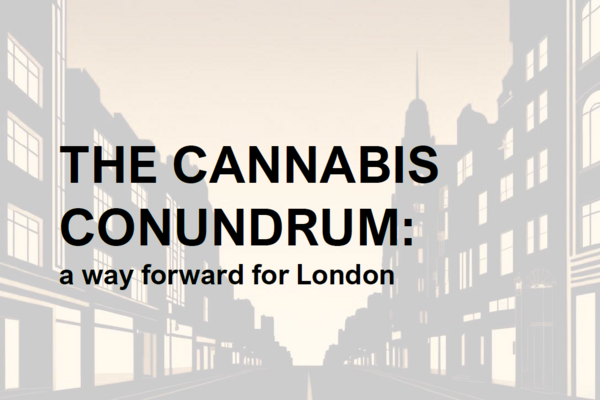In a groundbreaking report released in March 2025, the London Drugs Commission (LDC) has called for major changes to the UK’s approach to cannabis. Titled “The Cannabis Conundrum: A Way Forward for London,” the report rejects both current punitive laws and full commercial legalisation, proposing instead a nuanced, harm-reduction framework designed to meet public health and social equity goals.
The Commission’s central proposal is to remove natural cannabis from the Misuse of Drugs Act 1971 and reclassify it under the Psychoactive Substances Act 2016, effectively decriminalising possession while maintaining strict controls on supply and trafficking.
“The current legal framework is outdated, unjust, and ineffective,” the report states. “A new approach focused on public health, equity, and evidence is both necessary and urgent.”
Why Reform Is Needed
The Commission presents clear evidence that current cannabis laws are failing:
- Enforcement disproportionately targets Black Londoners, despite similar usage rates across ethnicities.
- Only one in three stop and searches results in any form of criminal evidence.
- Harsh penalties for low-level offences create lifelong consequences, often for behaviour that poses less risk than alcohol or tobacco use.
Despite some public calls for legalisation, the report urges caution. It notes that fully legal markets, such as those in Canada and the US, have not eliminated illicit trade or significantly improved health outcomes. In fact, commercialisation may worsen public health risks, especially where high-THC products and aggressive marketing are involved.
A Balanced Middle Ground
The LDC recommends a middle path: remove criminal penalties for personal possession, maintain prohibition of supply with lower penalties, and keep synthetic cannabinoids under strict controls due to their proven dangers.
“This is not about being soft on drugs,” said Commission Chair Lord Charlie Falconer. “It’s about being smart on drug policy.”
The Commission emphasises that reform must be driven by evidence and subject to ongoing review, not political expediency or international trends. A formal review of outcomes is recommended five years after implementation.
What the Commission Opposes
- Full legalisation and commercial sales
- Decriminalisation without structured harm reduction
- Policy shifts driven by political convenience
What This Means for the UK Cannabis Sector
For the CTA and its members, this report represents a historic opportunity to engage in meaningful policy reform. It validates concerns about outdated laws, policing inequities, and missed health interventions - while clearly rejecting simplistic legalisation that risks repeating the harms of tobacco and alcohol industries.
As the CTA continues its work with Parliament, regulators, and the public, the Commission’s findings provide solid, evidence-based groundwork for future discussions.
The message is clear: Cannabis law in the UK must change - and can change responsibly.
The 42 Detailed Recommendations
Grouped into key themes, the Commission's 42 proposals cover policy, health, policing, education, and legal reform:
Data & Monitoring
- Improve ethnicity-based cannabis use data.
- Commission updated cost-benefit analysis of legal markets.
- Monitor international legalisation trends.
Health & Harm Reduction
- Launch cannabis testing service in London.
- Research potency perception and behavioural impact.
- Study CBD-illicit cannabis co-use dynamics
Treatment & Services
- Identify what cannabis addiction treatments work and for whom.
- Update NICE guidance on cannabis misuse.
- Explore CBPMs in treatment of problematic use.
- Integrate mental health, physical health, and addiction services.
- Create a one-stop contact point across services.
- Include cannabis use in tobacco cessation efforts.
- Train staff in treating co-use of cannabis and tobacco.
Professional Training
- Add cannabis to pharmacy training curricula.
- Pilot pharmacist-led referrals to addiction support.
Policing & Diversion
- Ban smell of cannabis as grounds for stop and search.
- Improve stop and search data collection.
- Evaluate Precision S&S pilot outcomes.
- Expand trust-based stop and search methods.
- Track complaints by type and ethnicity.
- Centralise cannabis-related police data across boroughs.
- Mandate quarterly review of BWV footage for S&S.
- Exclude Outcome 22 diversions from DBS checks.
- Evaluate London diversion pilot outcomes.
- Require feedback from diversion services to police.
- Monitor ADDER diversion scheme performance.
- Expand diversion pilots across demographics.
- Standardise diversion across London.
- Record reasons for non-referral to diversion.
Legal Reform
- Move natural cannabis from MDA to PSA.
- Enable local byelaws to restrict public use.
- Remove possession from DBS disclosures.
- Consider limited, licensed home cultivation based on evidence.
Medical Cannabis
- Fund independent studies of CBPM outcomes.
- Apply lessons from Canadian medical cannabis policy.
- Improve police training on legal prescriptions.
- If proven effective, expand NHS access to unlicensed CBPMs.
Education
- Evaluate DART for earlier school drug education.
- Develop age-appropriate cannabis education with community input.
- Promote harm reduction in post-18 education.
- Create London-wide cannabis education guidance group.
Emerging Models
- Monitor cannabis social club models in Germany and Malta.






